Unit 5What were you doing when the rainstorm came Section A 1a-2d 课件+音频(共28张PPT) 人教版英语八年级下册
文档属性
| 名称 | Unit 5What were you doing when the rainstorm came Section A 1a-2d 课件+音频(共28张PPT) 人教版英语八年级下册 | 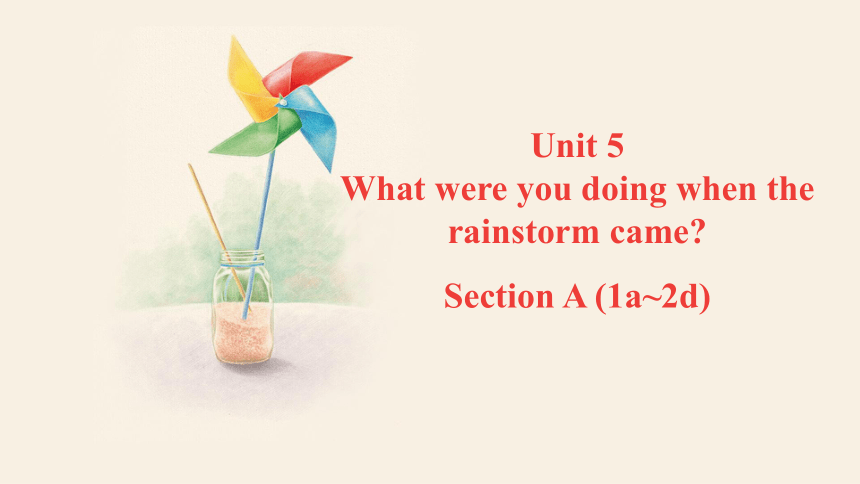 | |
| 格式 | pptx | ||
| 文件大小 | 7.9MB | ||
| 资源类型 | 教案 | ||
| 版本资源 | 人教新目标(Go for it)版 | ||
| 科目 | 英语 | ||
| 更新时间 | 2023-12-27 15:08:39 | ||
图片预览


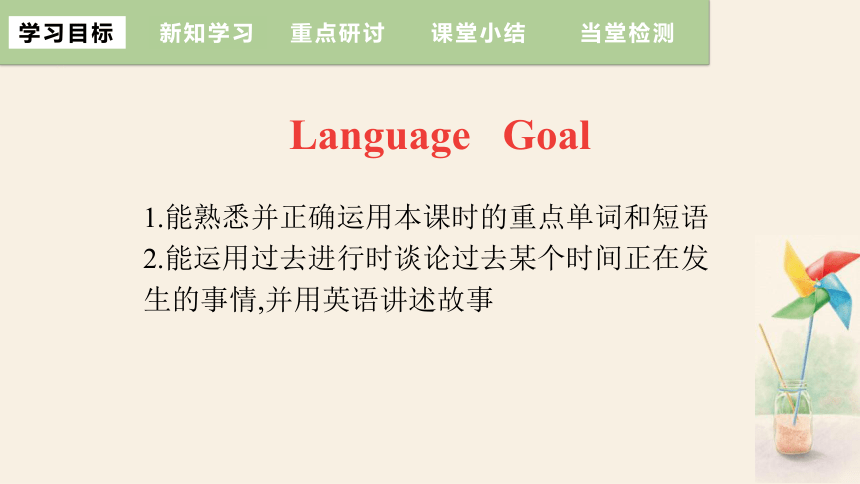
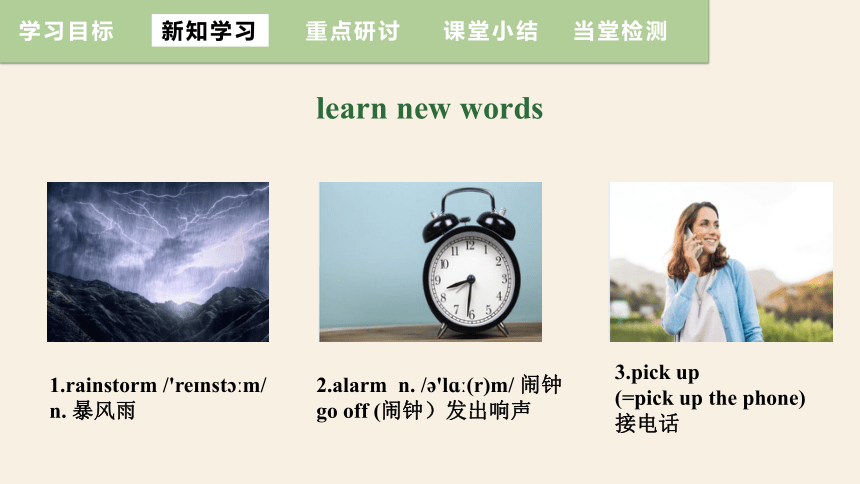


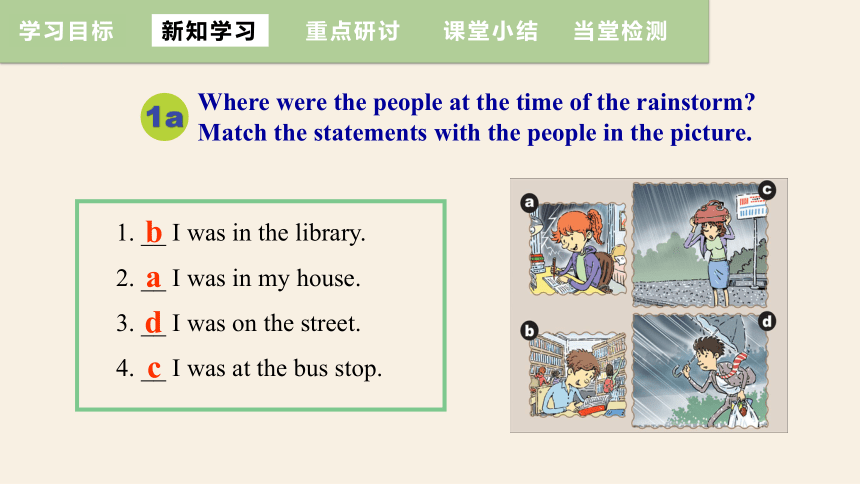
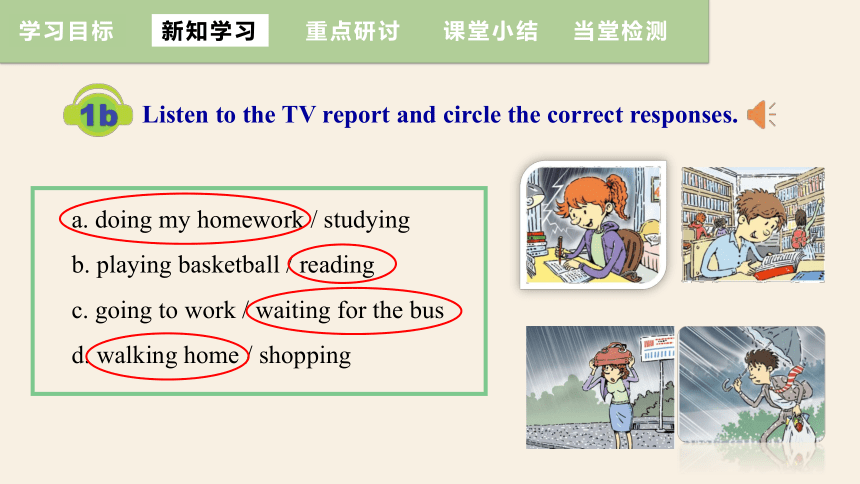
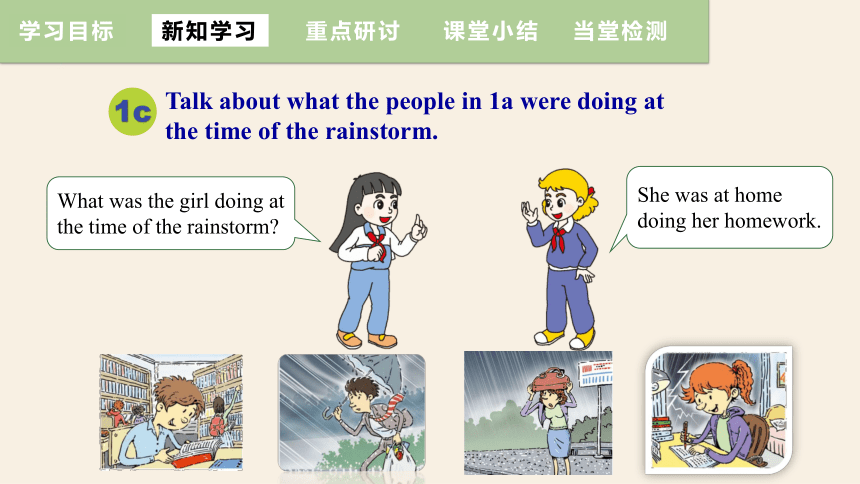
文档简介
(共28张PPT)
Unit 5
What were you doing when the rainstorm came
Section A (1a~2d)
新
课
导
入
Free talk
Where were you yesterday
What were you doing
Language Goal
新知学习
课堂小结
当堂检测
学习目标
重点研讨
1.能熟悉并正确运用本课时的重点单词和短语
2.能运用过去进行时谈论过去某个时间正在发生的事情,并用英语讲述故事
新知学习
课堂小结
当堂检测
学习目标
重点研讨
learn new words
1.rainstorm /'re nst m/
n. 暴风雨
2.alarm n. / 'lɑ (r)m/ 闹钟
go off (闹钟)发出响声
3.pick up
(=pick up the phone)
接电话
新知学习
课堂小结
当堂检测
学习目标
重点研讨
learn new words
It began to rain heavily .
/'hev l / adv.在很大程度上;大量地.
heavy adj. 重的;沉重的
begin /b 'g n/ v. 开始
(过去式 began)
begin to(doing) sth 开始做某事
Suddenly a boy came out .
/ s d nl / adv. 突然;忽然
He looked strange.
/stre nd / adj.奇特的;
奇怪的
新知学习
课堂小结
当堂检测
学习目标
重点研讨
words game
alarm
strange
heavily
begin
pick up
suddenly
go off
rainstorm
新知学习
课堂小结
当堂检测
学习目标
重点研讨
1a
Where were the people at the time of the rainstorm Match the statements with the people in the picture.
1. __ I was in the library.
2. __ I was in my house.
3. __ I was on the street.
4. __ I was at the bus stop.
b
d
c
a
新知学习
课堂小结
当堂检测
学习目标
重点研讨
1b
Listen to the TV report and circle the correct responses.
a. doing my homework / studying
b. playing basketball / reading
c. going to work / waiting for the bus
d. walking home / shopping
新知学习
课堂小结
当堂检测
学习目标
重点研讨
1c
Talk about what the people in 1a were doing at the time of the rainstorm.
What was the girl doing at the time of the rainstorm
She was at home doing her homework.
新知学习
课堂小结
当堂检测
学习目标
重点研讨
2a
Listen and number the pictures 1-5.
1
2
3
4
5
新知学习
课堂小结
当堂检测
学习目标
重点研讨
2b
Listen again. Fill in the blanks in the sentences in 2a.
My alarm didn’t go off so I ______ up late.
woke
I _____ to the bus stop but I still missed the bus.
ran
新知学习
课堂小结
当堂检测
学习目标
重点研讨
I ____________ for the bus when it began to rain heavily.
was waiting
I ____ so busy _______ for the umbrella that I didn’t see a car coming.
was
looking
I took a hot shower and ____ some warm food.
ate
新知学习
课堂小结
当堂检测
学习目标
重点研讨
Listen again and fill.
It was _______, my alarm didn't go off so I woke up late.
7:30
Then I ran to the bus stop but I still missed the bus. It was _____ when I got to school.
8:30
A terrible day
新知学习
课堂小结
当堂检测
学习目标
重点研讨
It was _______, it was time to go home. I was waiting for the bus when it began to rain heavily.
After that, I was so busy looking for the umbrella that I didn’t see a car coming. And it got water all over me.
_________, the bus came and brought me home. I took a hot shower and ate some warm food.
Finally
4:30
新知学习
课堂小结
当堂检测
学习目标
重点研讨
2c
Use the information in 2a to retell the story in a conversation between the boy and a TV reporter.
TV reporter: What happened yesterday
Boy: I woke up_________
TV reporter: Why
Boy: My alarm__________________
TV reporter: How did you get to the bus stop
Boy: __________________________
TV reporter: What were you doing when the rainstorm suddenly came
Boy: __________________________________________
Group7
Group1
Group8
Group2
Group6
Group5
Group3
Group4
新知学习
课堂小结
当堂检测
学习目标
重点研讨
Role play the conversation.
2d
Mary: What were you doing last night, Linda I called at seven and
you didn’t pick up.
Linda: Oh, I was in the kitchen helping my mom.
Mary: I see. I called again at eight and you didn’t answer then either.
Linda: What was I doing at eight Oh, I know. When you called, I was taking a shower.
Mary: But then I called again at nine.
新知学习
课堂小结
当堂检测
学习目标
重点研讨
Linda: Oh, I was sleeping at that time.
Mary: So early That’s strange.
Linda: Yeah, I was tired. Why did you call so many times
Mary: I needed help with my homework. So while you were sleeping, I called Jenny and she helped me.
新知学习
课堂小结
当堂检测
学习目标
重点研讨
Language points
1. I called at seven and you didn’t pick up.
pick up(=pick up the phone) 接电话
pick up 还有以下含义:
1) 拾起;抱起
e.g. The children picked up many sea shells at the seashore.
孩子们在海边捡到许多贝壳。
Pick that book up. 把那本书捡起来。
新知学习
课堂小结
当堂检测
学习目标
重点研讨
2) 搭载
e.g. The car stopped to pick me up. 汽车停下来接我。
We’ll send the ambulance to pick him up.
我们要派一辆救护车把他接走。
新知学习
课堂小结
当堂检测
学习目标
重点研讨
2.when, while连词,都有“当……时候”的意思。
(1) when既可表示某一时间点,也可以表示某一段时间 。
“when”后面通常用一般过去时,在when引导的时间状语从句中,其谓语动词可以是延续性的,也可以是非延续性的,可与主句中的谓语动词同时发生,也可在其后发生。
例如:I was reading a book when she came into my room.
当她进我房间的时候我正在看书。
新知学习
课堂小结
当堂检测
学习目标
重点研讨
(2)while只能表示某一段时间,不能表示某一时间点。在while引导的时间状语从句中,其谓语动词只能是延续性的,而且也只能与主句中的谓语动词同时发生或存在。“while”后面通常用过去进行时。
例如:While Jim was watching TV, Lin Tao came to see him.
当吉姆正在看电视的时候,林涛来看他。
新知学习
课堂小结
当堂检测
学习目标
重点研讨
when和while 连词.when表示“在那时”;while表示“而,却”,表对照关系.
e.g. I was doing my homework when the bell rang
我正在做家庭作业,就在这时门铃响了。
He is strong while his brother is weak.
他长得很结实,而他弟弟却很瘦弱
3.过去进行时 VS 现在进行时
含义: 表示过去某个时刻或某一时间段正进行的动作。 含义: 表示现在或现阶段正在
进行或发生的动作或存在的状态。
结构: 主语 + was/were + doing 结构:
主语 +am/is/are + doing
过去进行时
现在进行时
新知学习
课堂小结
当堂检测
学习目标
重点研讨
新知学习
课堂小结
当堂检测
学习目标
重点研讨
常用时间状语:at this time yesterday(last night/week/Sunday), at that time/moment , at+点钟 ( ten o’clock)+yesterday(last night/Sunday), when ,while 引导的时间状语从句等。 标志词:
now, at the moment,
look, listen 等。
过去进行时
现在进行时
新知学习
课堂小结
当堂检测
学习目标
重点研讨
4. I was waiting for the bus when it began to rain heavily.
begin v. (began) 开始
e.g. I’ll begin whenever you’re ready.你什么时候准备好我就开始。
常用的句型:begin to do与begin doing
一般来说,begin to do和begin doing可以互换,但在以下三种情况下,用to do。
(1)主语不是指人,而是it等。
e.g. It began to rain.
(2)begin后接表示心理活动的词。e.g. begin to know, 还有believe, wonder, think等词。
(3)begin本身是ing形式,为避免重复后接to do。 e.g. beginning to do
新知学习
课堂小结
当堂检测
学习目标
重点研讨
5.My alarm didn’t go off so I woke up late.
go off为不及物动词短语,在此意为“发出响声”,可指闹钟或警报器等突然发出声响。go off还可表示“(食物、饮料)变质;(电灯)熄灭”等含义。
e.g. My alarm clock didn’t go off this morning. I was late for work again.
今天早晨我的闹钟没有响,我又上班迟到了。
Listen! The bell is going off. 听!铃响了。
All the lights went off suddenly. 所有的灯突然都熄灭了。
The bottle of milk has gone off.这瓶牛奶已经变质了。
新知学习
课堂小结
当堂检测
学习目标
重点研讨
Unit 5
Section A (1a~2d)
重点单词及短语:
_______________________________
_______________________________
_______________________________
_______________________________
_______________________________
_______________________________
rainstorm
过去进行时的构成及用法:
过去进行时表示1._____________________________________________________________;
其结构:
2.____________+动词的现在分词形式。
过去某一时刻正在发生的动作或持续的状态
was/were
alarm
go off
begin (began)
heavily
suddenly
pick up (the phone)
strange
be busy doing
so… that
wake up
go off
pick up
wait for
look for
at the time of …
新知学习
课堂小结
当堂检测
学习目标
重点研讨
一、用所给词的正确形式填空。
1. What ______ (be) you ______ (do) when he arrived
2. Jim _____________ (sleep) when I came in.
3. They _____________ (watch) TV at 8:00 yesterday evening.
4. Now he __________ (read) and _________(write).
5. You’d better make a study plan at the __________(begin) of the new term.
were
doing
was sleeping
were watching
is reading
writing
beginning
Unit 5
What were you doing when the rainstorm came
Section A (1a~2d)
新
课
导
入
Free talk
Where were you yesterday
What were you doing
Language Goal
新知学习
课堂小结
当堂检测
学习目标
重点研讨
1.能熟悉并正确运用本课时的重点单词和短语
2.能运用过去进行时谈论过去某个时间正在发生的事情,并用英语讲述故事
新知学习
课堂小结
当堂检测
学习目标
重点研讨
learn new words
1.rainstorm /'re nst m/
n. 暴风雨
2.alarm n. / 'lɑ (r)m/ 闹钟
go off (闹钟)发出响声
3.pick up
(=pick up the phone)
接电话
新知学习
课堂小结
当堂检测
学习目标
重点研讨
learn new words
It began to rain heavily .
/'hev l / adv.在很大程度上;大量地.
heavy adj. 重的;沉重的
begin /b 'g n/ v. 开始
(过去式 began)
begin to(doing) sth 开始做某事
Suddenly a boy came out .
/ s d nl / adv. 突然;忽然
He looked strange.
/stre nd / adj.奇特的;
奇怪的
新知学习
课堂小结
当堂检测
学习目标
重点研讨
words game
alarm
strange
heavily
begin
pick up
suddenly
go off
rainstorm
新知学习
课堂小结
当堂检测
学习目标
重点研讨
1a
Where were the people at the time of the rainstorm Match the statements with the people in the picture.
1. __ I was in the library.
2. __ I was in my house.
3. __ I was on the street.
4. __ I was at the bus stop.
b
d
c
a
新知学习
课堂小结
当堂检测
学习目标
重点研讨
1b
Listen to the TV report and circle the correct responses.
a. doing my homework / studying
b. playing basketball / reading
c. going to work / waiting for the bus
d. walking home / shopping
新知学习
课堂小结
当堂检测
学习目标
重点研讨
1c
Talk about what the people in 1a were doing at the time of the rainstorm.
What was the girl doing at the time of the rainstorm
She was at home doing her homework.
新知学习
课堂小结
当堂检测
学习目标
重点研讨
2a
Listen and number the pictures 1-5.
1
2
3
4
5
新知学习
课堂小结
当堂检测
学习目标
重点研讨
2b
Listen again. Fill in the blanks in the sentences in 2a.
My alarm didn’t go off so I ______ up late.
woke
I _____ to the bus stop but I still missed the bus.
ran
新知学习
课堂小结
当堂检测
学习目标
重点研讨
I ____________ for the bus when it began to rain heavily.
was waiting
I ____ so busy _______ for the umbrella that I didn’t see a car coming.
was
looking
I took a hot shower and ____ some warm food.
ate
新知学习
课堂小结
当堂检测
学习目标
重点研讨
Listen again and fill.
It was _______, my alarm didn't go off so I woke up late.
7:30
Then I ran to the bus stop but I still missed the bus. It was _____ when I got to school.
8:30
A terrible day
新知学习
课堂小结
当堂检测
学习目标
重点研讨
It was _______, it was time to go home. I was waiting for the bus when it began to rain heavily.
After that, I was so busy looking for the umbrella that I didn’t see a car coming. And it got water all over me.
_________, the bus came and brought me home. I took a hot shower and ate some warm food.
Finally
4:30
新知学习
课堂小结
当堂检测
学习目标
重点研讨
2c
Use the information in 2a to retell the story in a conversation between the boy and a TV reporter.
TV reporter: What happened yesterday
Boy: I woke up_________
TV reporter: Why
Boy: My alarm__________________
TV reporter: How did you get to the bus stop
Boy: __________________________
TV reporter: What were you doing when the rainstorm suddenly came
Boy: __________________________________________
Group7
Group1
Group8
Group2
Group6
Group5
Group3
Group4
新知学习
课堂小结
当堂检测
学习目标
重点研讨
Role play the conversation.
2d
Mary: What were you doing last night, Linda I called at seven and
you didn’t pick up.
Linda: Oh, I was in the kitchen helping my mom.
Mary: I see. I called again at eight and you didn’t answer then either.
Linda: What was I doing at eight Oh, I know. When you called, I was taking a shower.
Mary: But then I called again at nine.
新知学习
课堂小结
当堂检测
学习目标
重点研讨
Linda: Oh, I was sleeping at that time.
Mary: So early That’s strange.
Linda: Yeah, I was tired. Why did you call so many times
Mary: I needed help with my homework. So while you were sleeping, I called Jenny and she helped me.
新知学习
课堂小结
当堂检测
学习目标
重点研讨
Language points
1. I called at seven and you didn’t pick up.
pick up(=pick up the phone) 接电话
pick up 还有以下含义:
1) 拾起;抱起
e.g. The children picked up many sea shells at the seashore.
孩子们在海边捡到许多贝壳。
Pick that book up. 把那本书捡起来。
新知学习
课堂小结
当堂检测
学习目标
重点研讨
2) 搭载
e.g. The car stopped to pick me up. 汽车停下来接我。
We’ll send the ambulance to pick him up.
我们要派一辆救护车把他接走。
新知学习
课堂小结
当堂检测
学习目标
重点研讨
2.when, while连词,都有“当……时候”的意思。
(1) when既可表示某一时间点,也可以表示某一段时间 。
“when”后面通常用一般过去时,在when引导的时间状语从句中,其谓语动词可以是延续性的,也可以是非延续性的,可与主句中的谓语动词同时发生,也可在其后发生。
例如:I was reading a book when she came into my room.
当她进我房间的时候我正在看书。
新知学习
课堂小结
当堂检测
学习目标
重点研讨
(2)while只能表示某一段时间,不能表示某一时间点。在while引导的时间状语从句中,其谓语动词只能是延续性的,而且也只能与主句中的谓语动词同时发生或存在。“while”后面通常用过去进行时。
例如:While Jim was watching TV, Lin Tao came to see him.
当吉姆正在看电视的时候,林涛来看他。
新知学习
课堂小结
当堂检测
学习目标
重点研讨
when和while 连词.when表示“在那时”;while表示“而,却”,表对照关系.
e.g. I was doing my homework when the bell rang
我正在做家庭作业,就在这时门铃响了。
He is strong while his brother is weak.
他长得很结实,而他弟弟却很瘦弱
3.过去进行时 VS 现在进行时
含义: 表示过去某个时刻或某一时间段正进行的动作。 含义: 表示现在或现阶段正在
进行或发生的动作或存在的状态。
结构: 主语 + was/were + doing 结构:
主语 +am/is/are + doing
过去进行时
现在进行时
新知学习
课堂小结
当堂检测
学习目标
重点研讨
新知学习
课堂小结
当堂检测
学习目标
重点研讨
常用时间状语:at this time yesterday(last night/week/Sunday), at that time/moment , at+点钟 ( ten o’clock)+yesterday(last night/Sunday), when ,while 引导的时间状语从句等。 标志词:
now, at the moment,
look, listen 等。
过去进行时
现在进行时
新知学习
课堂小结
当堂检测
学习目标
重点研讨
4. I was waiting for the bus when it began to rain heavily.
begin v. (began) 开始
e.g. I’ll begin whenever you’re ready.你什么时候准备好我就开始。
常用的句型:begin to do与begin doing
一般来说,begin to do和begin doing可以互换,但在以下三种情况下,用to do。
(1)主语不是指人,而是it等。
e.g. It began to rain.
(2)begin后接表示心理活动的词。e.g. begin to know, 还有believe, wonder, think等词。
(3)begin本身是ing形式,为避免重复后接to do。 e.g. beginning to do
新知学习
课堂小结
当堂检测
学习目标
重点研讨
5.My alarm didn’t go off so I woke up late.
go off为不及物动词短语,在此意为“发出响声”,可指闹钟或警报器等突然发出声响。go off还可表示“(食物、饮料)变质;(电灯)熄灭”等含义。
e.g. My alarm clock didn’t go off this morning. I was late for work again.
今天早晨我的闹钟没有响,我又上班迟到了。
Listen! The bell is going off. 听!铃响了。
All the lights went off suddenly. 所有的灯突然都熄灭了。
The bottle of milk has gone off.这瓶牛奶已经变质了。
新知学习
课堂小结
当堂检测
学习目标
重点研讨
Unit 5
Section A (1a~2d)
重点单词及短语:
_______________________________
_______________________________
_______________________________
_______________________________
_______________________________
_______________________________
rainstorm
过去进行时的构成及用法:
过去进行时表示1._____________________________________________________________;
其结构:
2.____________+动词的现在分词形式。
过去某一时刻正在发生的动作或持续的状态
was/were
alarm
go off
begin (began)
heavily
suddenly
pick up (the phone)
strange
be busy doing
so… that
wake up
go off
pick up
wait for
look for
at the time of …
新知学习
课堂小结
当堂检测
学习目标
重点研讨
一、用所给词的正确形式填空。
1. What ______ (be) you ______ (do) when he arrived
2. Jim _____________ (sleep) when I came in.
3. They _____________ (watch) TV at 8:00 yesterday evening.
4. Now he __________ (read) and _________(write).
5. You’d better make a study plan at the __________(begin) of the new term.
were
doing
was sleeping
were watching
is reading
writing
beginning
同课章节目录
- Unit 1 What's the matter?
- Section A
- Section B
- Unit 2 I'll help to clean up the city parks.
- Section A
- Section B
- Unit 3 Could you please clean your room?
- Section A
- Section B
- Unit 4 Why don't you talk to your parents?
- Section A
- Section B
- Unit 5 What were you doing when the rainstorm came
- Section A
- Section B
- Review of Units 1-5
- Unit 6 An old man tried to move the mountains.
- Section A
- Section B
- Unit 7 What's the highest mountain in the world?
- Section A
- Section B
- Unit 8 Have you read Treasure Island yet?
- Section A
- Section B
- Unit 9 Have you ever been to a museum?
- Section A
- Section B
- Unit 10 I've had this bike for three years.
- Section A
- Section B
